In Conversation with Chef Dominique Crenn
At Atelier Crenn in San Francisco, Chef Dominique Crenn uses her restaurant as a platform to tell stories and push boundaries, both at the table and in society.
Published on Mar. 30, 2018
Interview by ANTONIO DIAZ
Photography by ANTONIO DIAZ and JIM SULLIVAN
Winter has come with its cool breeze
See this—most adored gift from Neptune, an aureate bloom
Stepping ashore with a rosy glow as luminous as its gilded crown
To bury in fallen leaves my treasures of the earth and sea
And the shimmering pearls in the depths of the gargoyle’s trove
Beneath the bluffs an armored gent listens
To the snowy stillness of soft swimming creatures
While the ephemeral beauty born of jade effervescence sang
For the verdant bounty of the gatherer’s harvest in caring hands
From the Royal Lady’s fruitful labor a dulcet offering
Deep in the woods, in reverie of days ahead
Winter has come and is full of sweet surprises
Sweetness, bounty, thanks
–February 1st, Atelier Crenn
“I was not trained as a chef, so I never understood menus. I found them quite boring, and I thought when you serve something you want to tell a story,” says Chef Dominique Crenn on a brisk February morning at her flagship San Francisco restaurant, Atelier Crenn, where her menu is anything but boring. Presented in the form of an esoteric poem, Crenn pens each poem, and every line represents a dish that will be found among the thirteen courses or so of her tasting menu. I must admit, I found myself attempting to decode each dish before its arrival, like a word game followed by an “ah-ha” moment once our waiter illuminated the story or ingredients behind each preparation.
I’m not one for word games, but this gamification (whether Crenn’s intention or one fabricated in my own head) brought a sense of comfort and approachability to fine dining—an experience that can feel ostentatious or rigid. And just as her menu encourages diners to ponder intellectually about the intersection of art, language and food, Crenn embodies a similar philosophy in life.
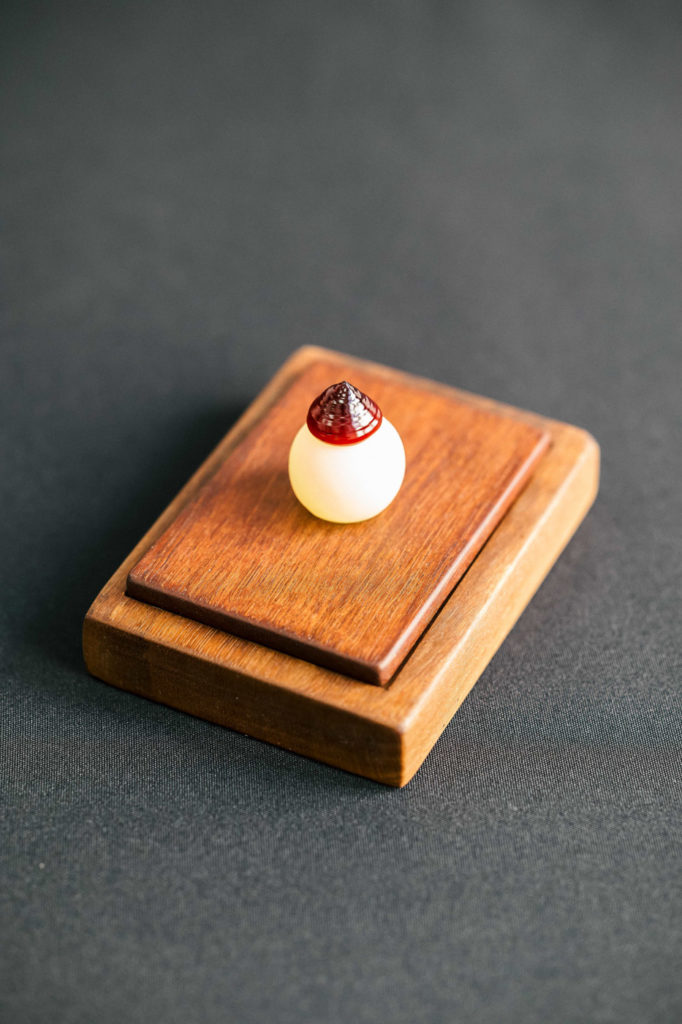
Kir Breton
Winter has come with its cool breeze
Adopted at 18 months by a French couple in Versailles, Crenn is no stranger to searching for identity—both personally and societally. That spirit of pursuit can be a force that motivates the creative mind, but more importantly, an empathetic one as well. When we question our purpose, identity and impact of our actions in society, potential solutions for complex problems can seem more attainable.
In many ways, American society is facing an existential crisis, with elements trickling down to nearly every industry, including the restaurant world. The #MeToo movement, immigration, agricultural policy, appropriation, and activism have all contributed to reshaping the conversation about food as a whole. For Crenn, it’s a dialogue she isn’t afraid to have, and she’s willing to leverage her renowned, Michelin-starred career to amplify what she believes in.
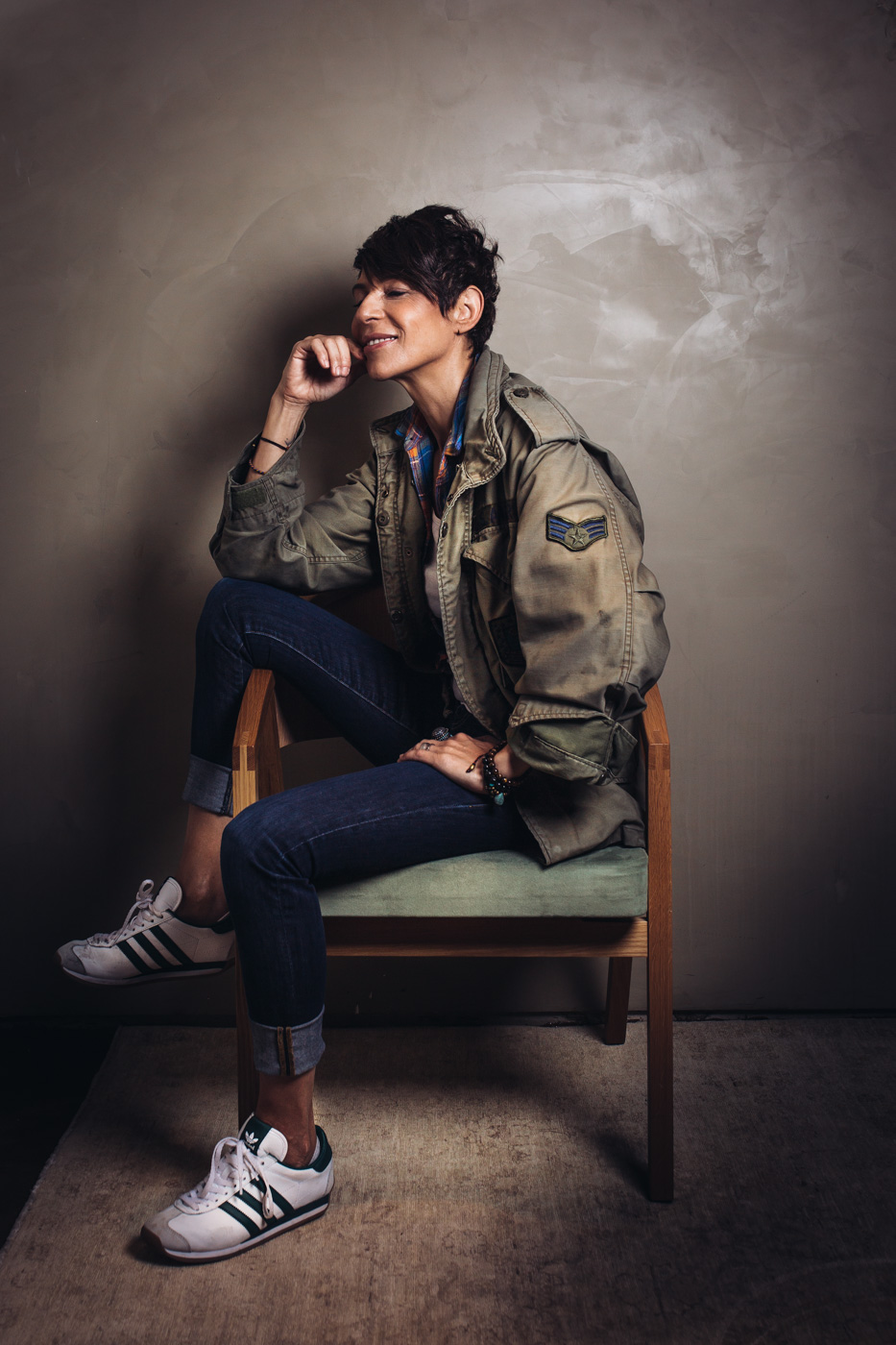
Your food tells a story, and having dined at Atelier Crenn, it’s apparent that part of that story is your personal experience. How is that different than a chef inspired by visiting France or Italy?
Dominique Crenn: It’s like when you put yourself out there and not being afraid of judgement—kind of being a little bit uncomfortable because you’re opening yourself to others.
I believe we have to know our history and celebrate what happened in the past so we don’t forget and can move forward with the present and the future. It’s really what makes me who I am today—those moments in my life with my grandmother or parents or even travelling the world. I’m not taking that for granted, and I want to cherish that forever.
When it comes to food, you can go to a book and find a recipe and it’s just what it is—there is no soul, there is no meaning, there is no purpose. There’s no sense of discovery to it.
To understand humanity and to understand how we can move forward in this world, we need to know what happened before and where we’ve been, and learn the joy—but also the struggle that’s been happening before. That’s important to me. You’ve got to search for your own identity. You’ve got to make your identity, but you have to also understand your history.
You mentioned you had taken a DNA test to better understand your roots.
Dominique: It’s a crazy thing. Everybody knows I was adopted and I was born in France—in Versailles—and I had wonderful parents. They are my parents—the people who adopted me. It’s easy to have a baby, but it’s not easy to be a parent. I wanted to find something—my history, the history of the making of Dominique, where I come from. And I’ve got to tell you, I got my DNA back and it’s all over the world. What’s interesting is it started in Southeast Asia and then Siberia—the Yakut, a tribe in Siberia. It’s a beautiful tribe, and I started to listen to their story. There are so many rituals, there are so many connections with the outside—the planet, Earth, the water, the mountains, and the sky.
Then it goes up to Finland, and it went down to all those Nordic countries. Up to Germany, France, and then it goes down to Iberia—which is Portugal and Spain—Italy, the Balkans, North Africa, and Africa. But what it’s telling you is that we are from everywhere. My DNA comes from the whole world.
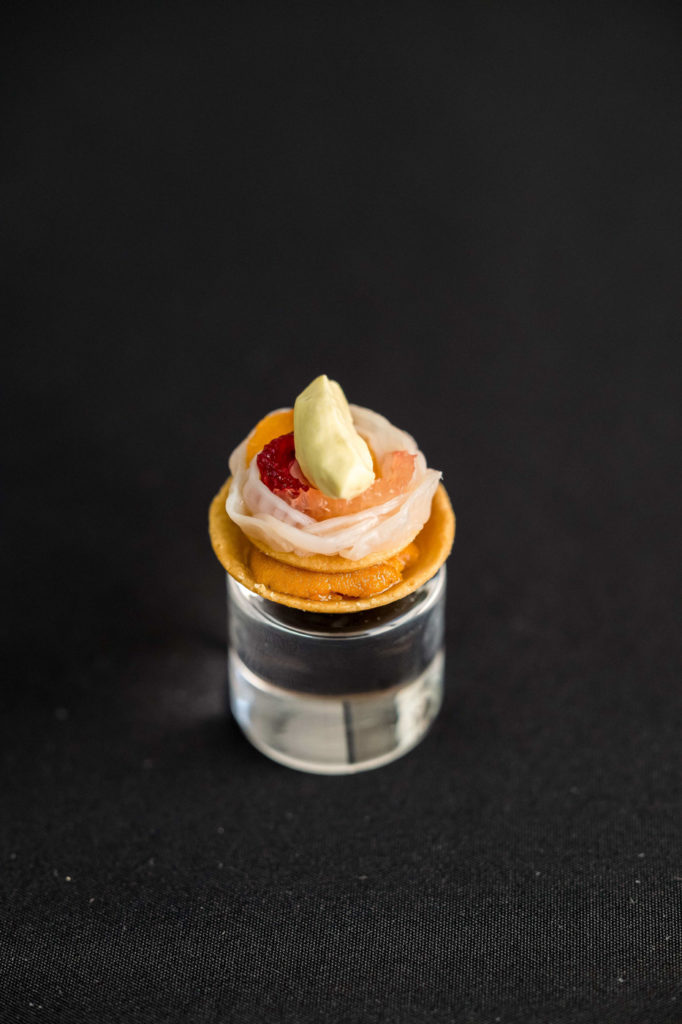
Geoduck, Sea Urchin & Citrus
See this – most adored gift from Neptune, an aureate bloom
How did that make you feel when you saw such diversity in your blood?
Dominique: That we are one world. It’s so much more rich than if there is no diversity. When you do a recipe, you have to layer the flavor, you have to be diverse about things—they might be singular on their own, but when they come together with their diversity of flavor, it’s an explosion of deliciousness. If this world comes together with embracing the diversity of who we are, the color of our skin, the color of our eyes, the culture—we will be such a better world.
No borders.
Dominique: There are no borders in the world. I don’t know why we created borders—maybe because we are so scared of understanding who we are, and so scared about what others will take away from us. People need to come together to learn from each other, but that’s the way I look at the world and that’s the way I look at my team and why they are here. We’re not better than anyone, but nobody is better than us. It’s just that we are equal—it doesn’t matter.
I’m not trying to impose anything on anyone. I want to be able to have a space where I can have a conversation and anyone can come here and be a part of that conversation.

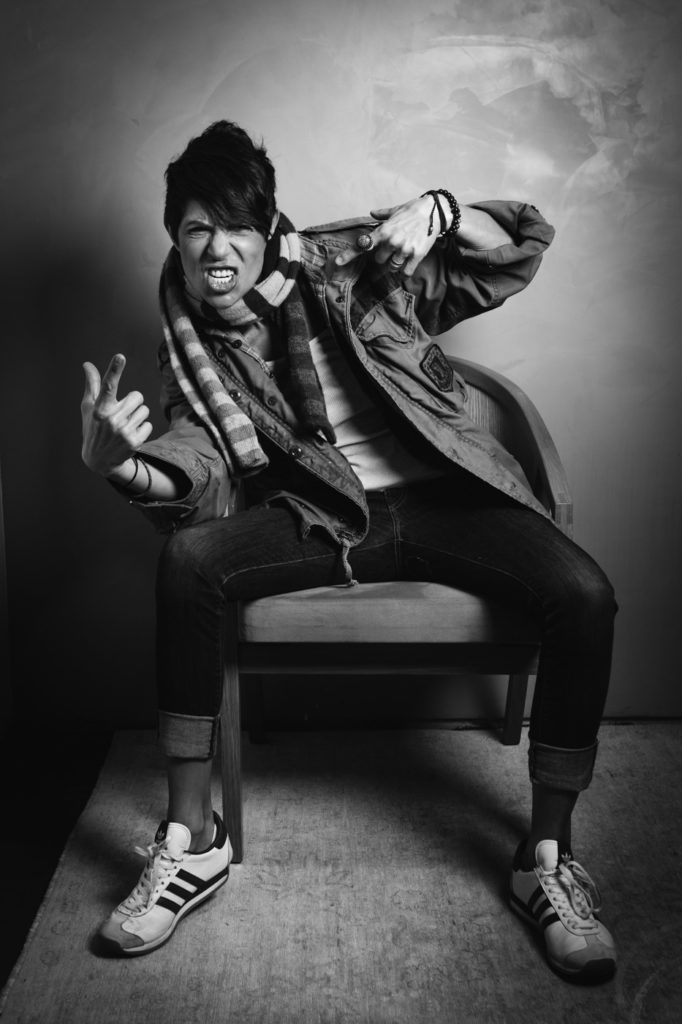
A search on Google says this restaurant is modern French.
Dominique: [Pause] Oui, oui. [Laughs] What is modern French?
That’s what I want to know.
Dominique: Why do we need to put a label on something when sometimes there is no label needed? It’s also when you start to get into award ceremonies—why are we labeling restaurant number one, number two, number three?
Everything is subjective; as humans, we are subjective. There are things I’m going to like and you’re not going to like; it doesn’t mean that those things are not good or are good.
Throughout dinner, you are presented with a wealth of information on each dish including the farms you work with in California. What can you tell me about your connection with farmers?
Dominique: Both of [my parents] were farmers in Brittany, and I spent a lot of time on the farm as a youngster. I was quite fascinated by the work, the passion, and the understanding of the way they were doing things. I remember one of my uncle’s farms was a potato farm—Brittany eats a lot of potato—and I was this young girl, maybe nine or eight years old, and I remember I was watching those people’s faces. I could see the sweat coming down and the sun beaming on their faces, and then the different layers of their skin—and their eyes were focusing on making sure what they were picking was the right potato.
Their hands were so dirty and dark under their nails, but it was this sense of connection of what they were doing. And being a farmer is not about money; it’s about how you are doing the right thing. It’s a very special thing for me.
When I came [to California], I was so fascinated with the farmers and talking to them, and also understanding their struggle because this country is basically pushing away the rural and the farming and just doing industrial farming—which I don’t think is the right thing to do. These people, they need to be on the farm for generation after generation, and they have knowledge about things they are doing. I want to support them.
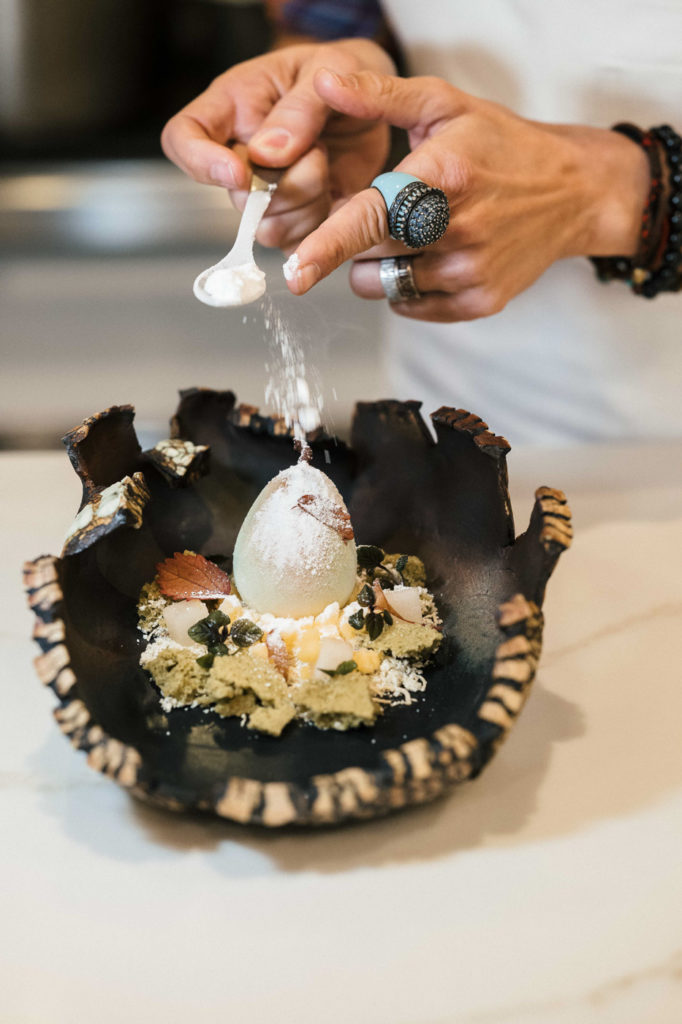
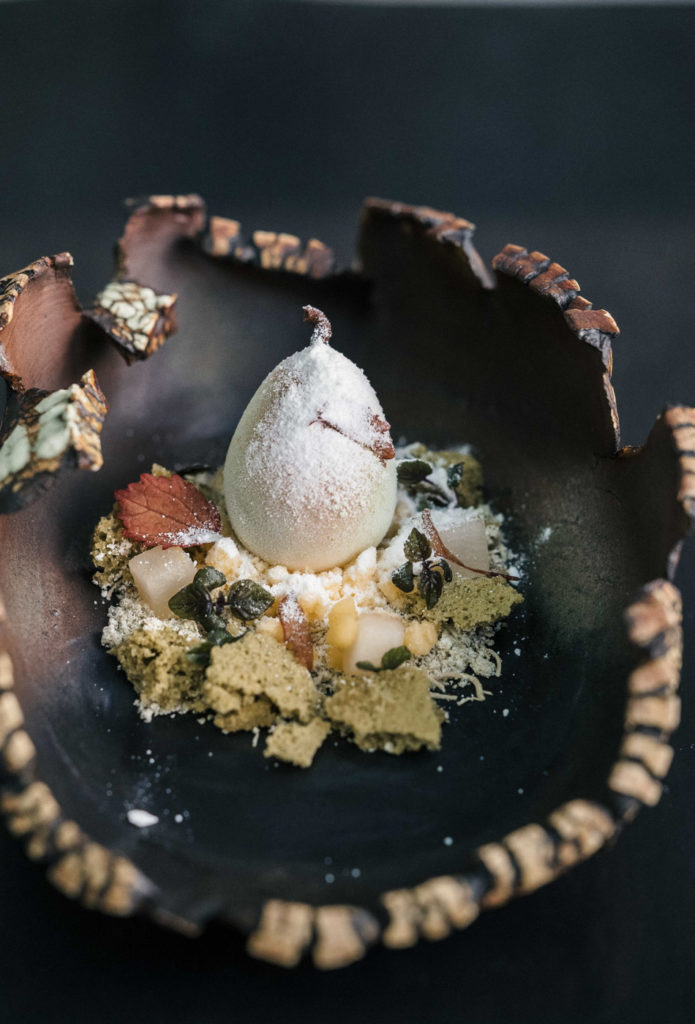
As a chef, as an owner, as an employer working in a place like California, do you feel a sense of responsibility to be outspoken on social or political issues?
Dominique: Food is politics. Everything is politics—but we need to be activists for it.
It’s a must because a lot of life depends on the earth; a lot of the wellbeing of the planet depends on earth. We can’t be complacent about what’s going on.
We talk about immigration. First of all, we need to really understand that California used to belong to Mexico a long time ago. We are just guests here, so we need to celebrate this and we don’t own anything; we were just put in a place where we need to embrace the history of it. We have a responsibility as chefs that what we do in our kitchen and with our employees, we determine what we do in the world.
When you are given a platform, it’s how you use it. There are too many lives you’re dealing with—not just human life, [but also] animal life. We have to be at the forefront of the dialogue on changing things.
Look at France. France was not even a culinary destination before Catherine de Medici came. From Italy, she brought tomatoes, artichokes—a lot of things. She brought Italian cuisine to France; that started to change the landscape of what became French cuisine. This is something we need to realize—there is always something that happened to shape the way a country becomes, culinary-wise.
I always say food is the core of society; if there is no food, there is no society.
That’s why I want to make sure that what we do, we have a hand on everything. That’s why we want to have a hand on making our own produce too.
To be more vertically integrated.
Dominique: It is time-consuming, but it’s worth it. When you don’t have information, you don’t make the right decision. If you take your time to gather information and to get knowledge on what you’re doing, then you can make your decision. We live in a world that is about greed. I really don’t care if the stock market is high—it doesn’t mean anything to me. What it means is people are getting richer and some people are getting poorer. What’s the infrastructure? Where is the money going? How are we caring for the people? How are we caring for our communities?
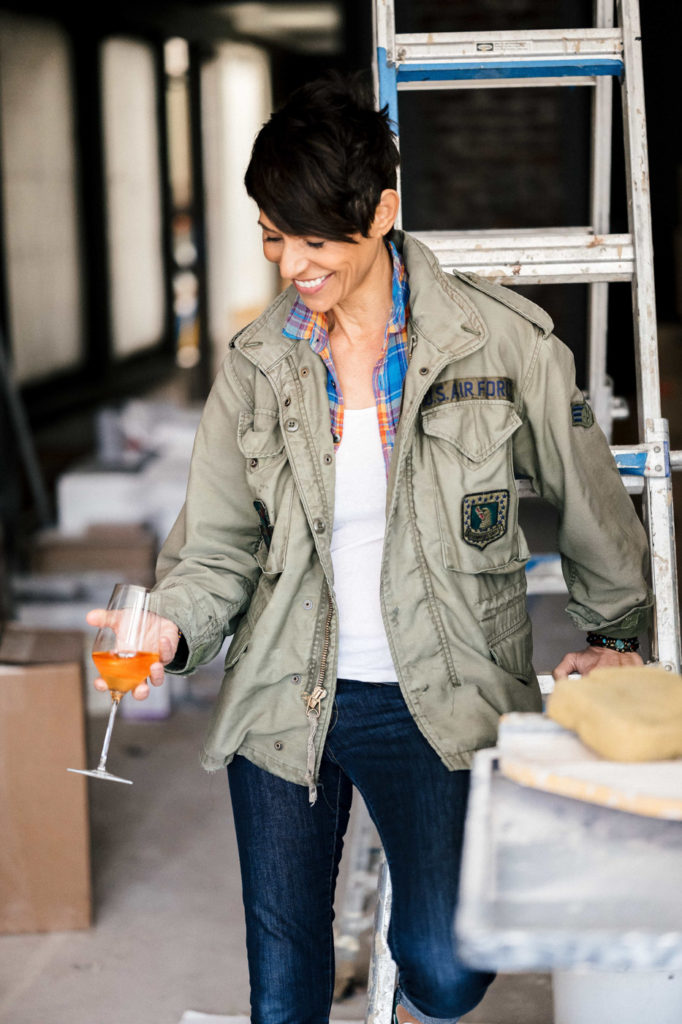
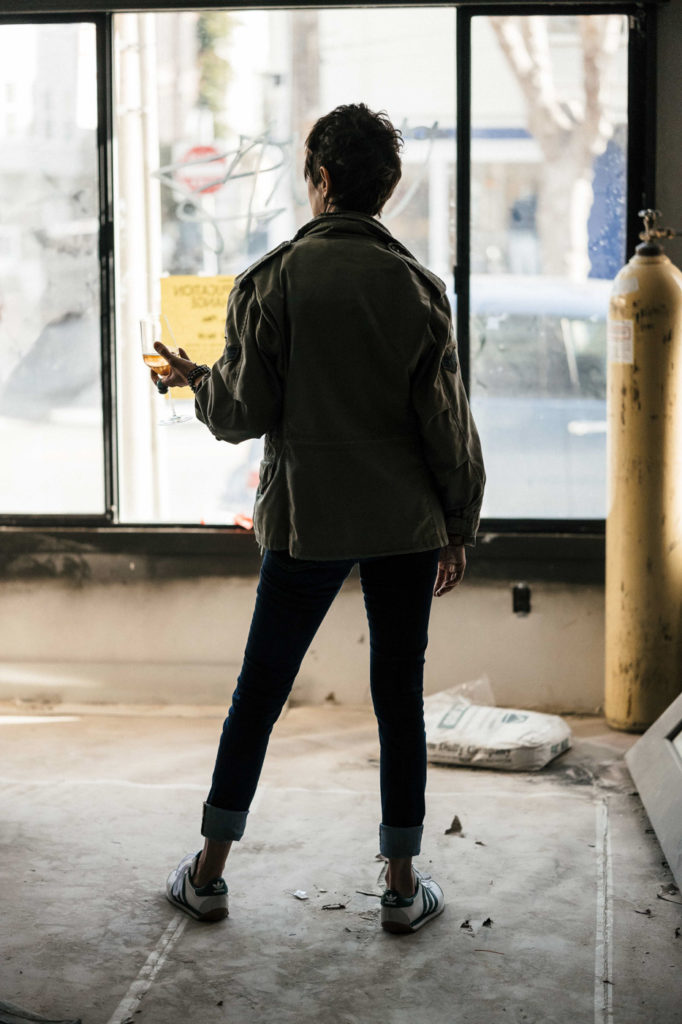
Last year, you had some words to say to San Pellegrino. And now in light of the #MeToo movement, do you feel a responsibility to be a voice for women in the industry? And is it okay to be expected of someone in your position as a prominent chef in the industry?
Dominique: I‘ve been given a platform, and often when people get to celebrity status—which I do not like to be—they suddenly forget about where they come from and how they came there; they start to become very selfish and then they don’t participate in the change. For me, it’s different; I’m still the same, but now I’ve been given a platform—so yes, I want to speak about this. With San Pellegrino, they reached out—[particularly] the one in the United States. What I said to them was, “Maybe you can be a part of the change within your company, speaking out about the things that need to change.”
But what I want to say is the way we’re going to change things, we need to have those people involved in the change. It’s the same thing with the #MeToo movement. If you want to expose people, and it is your prerogative to write an article, and you want to know the dirt about people so you can sell your article—I’m not going to say who’s doing that right now—what kind of change are you doing? The culture needs to change, but now the way we’ve got to change things is everybody on deck. And the people who were complicit about everything that happens in that toxic culture, we need to bring them and add them to part of the dialogue. That’s going to be very important.
The women’s series we’re doing, April Bloomfield is going to be a part of it—but that was decided a year ago and then those things came out. There is no but and there are no excuses. She wants to be a better person—who are we tell her to go to hell? She wants to be a part of the change, we want to welcome her and that might be a place for her: to cook, to celebrate women, and to maybe have a statement about this. That’s the way we are going to change things. Everybody needs to be involved.
I’m so curious to see what the next-generation of chefs will look like. They might not be chefs or restaurant owners yet, but they’re living through this change in culture today.
Dominique: When the cooking world started to be a celebrity world, that generation created a lot of egos. “I worked there; I’m a badass.” I hope the way of thinking of that generation will die. The new generation—I hope they will like a sense of respect, a sense of humanity, a different way of doing things. A sense of learning—of pushing the boundary of culture—a sense of community and being conscious, and I think that’s going to happen. Not tomorrow, but I hope in ten years from now. And I hope people will look back here, [and say] “I worked with a group that really showed us something more than just cooking.”
——
The interview was edited for clarity and length. Atelier Crenn is located in San Francisco’s Cow Hollow neighborhood. Be sure to pop into Bar Crenn, Crenn’s newest wine lounge next door.






Our comments section is for members only.
Join today to gain exclusive access.